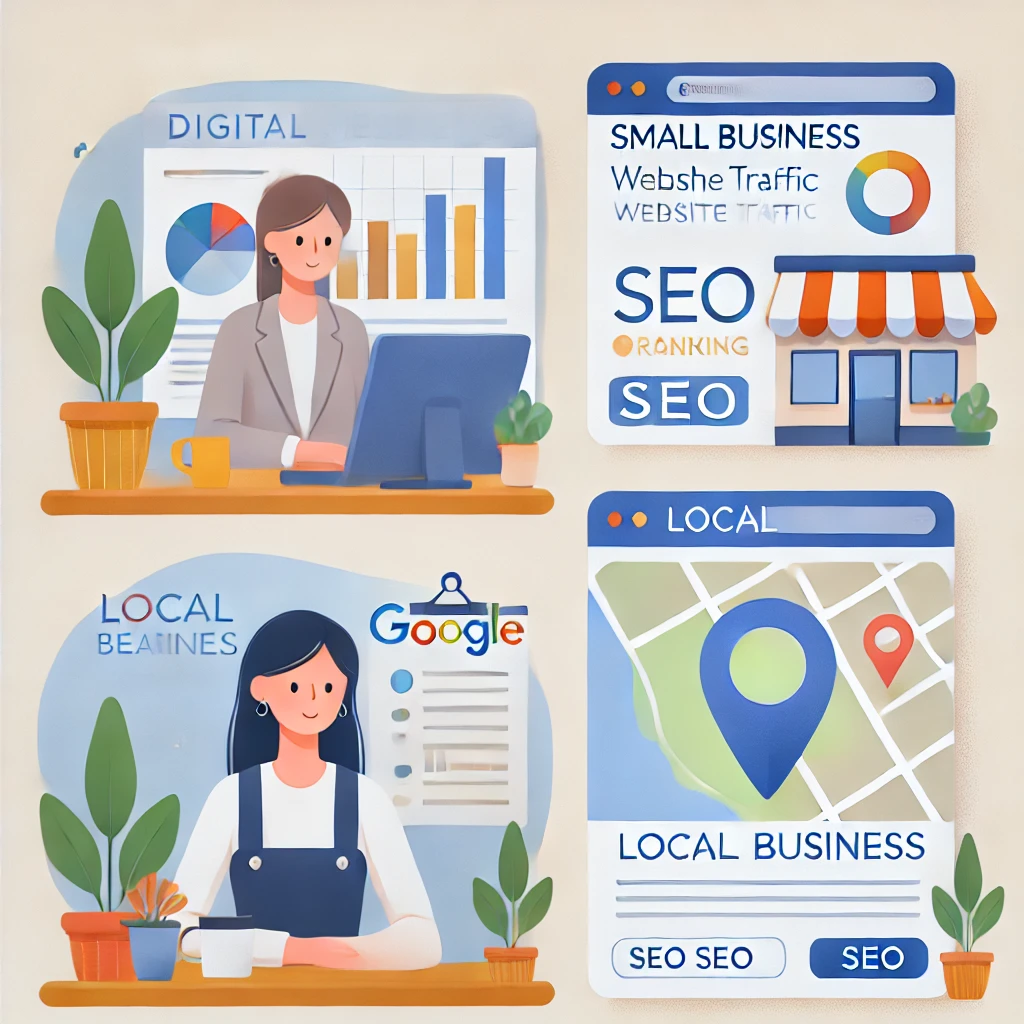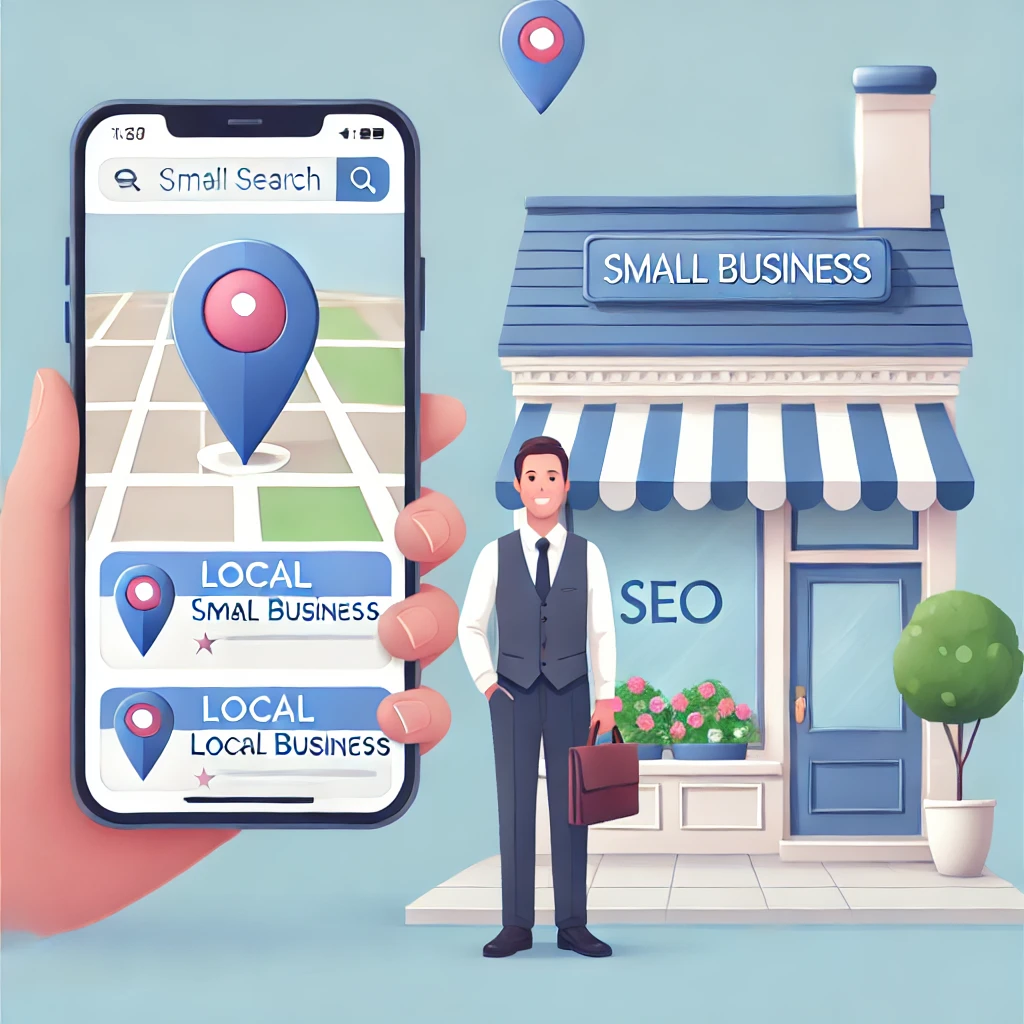
Let’s be real—running a small business today isn’t easy. You’ve got to juggle products and a hundred other things while trying to stand out from the crowd. And when it comes to marketing, it can feel like you’re just throwing spaghetti at the wall, hoping something sticks. But here’s the truth: SEO (Search Engine Optimization) can be your secret weapon in the digital marketing world.
You must have heard about SEO but aren’t sure how it works or why it’s important. You’re not alone! Many small business owners know it has something to do with Google, but they will say, “It sounds technical, expensive, or just out of reach.” I’m here to show you that it’s one of the smartest, most affordable, and most effective ways to grow your business online in 2025.
What is digital marketing?
Digital marketing is simply any marketing you do online to connect with potential customers. Think of it as promoting your business, just like you might with fliers, ads, or word-of-mouth, but instead of only reaching people locally, you’re using the internet to reach a much larger audience. With digital marketing, you use online channels like Google, social media, email, and your websites to connect to your customers.
Digital marketing is often more affordable than traditional marketing, and, best of all, it’s measurable. You can track exactly how many people saw your ad, clicked on your website, or made a purchase. This means you can make smarter decisions and continuously improve your marketing efforts.
Digital marketing includes various approaches, such as:
- SEO (Search Engine Optimization): Helping people find your business when they search online.
- PPC (Pay-Per-Click Advertising): Paying for ads to show up in search results or on social media.
- Content Marketing: Creating valuable content like blogs, videos, and social media posts to engage potential customers.
- Email Marketing: Reaching out to customers through newsletters or promotional emails.
- Social Media Marketing: using platforms like Instagram, Facebook, and LinkedIn to engage with your audience.
To cut the whole story short, digital marketing is a powerful tool that helps small businesses get noticed online and connect with people who are actively looking for what they offer. Whether you’re aiming to increase website traffic, generate leads, or boost sales, digital marketing has the potential to bring big results without needing a big budget.
What is SEO, and Why Should You Care?
At its core, SEO is about making your website show up on Google when people search for things related to your business. it’s like putting a bright, flashing sign on the internet saying, “Hey, I’m here, and I’ve got what you’re looking for.” Unlike paid ads, where you are paying for every click, SEO is organic, meaning once you rank well, people find you for free.
Why should you care? Because customers are online 24/7, SEO can bring them to your doorstep without spending a fortune.
Types of SEO
SEO, or Search Engine Optimization, is like a treasure map for websites to help them get found by search engines like Google. There are several types of SEO, each focusing on different aspects of how to improve a site’s visibility. Let’s break them down:
On-Page SEO
On-Page SEO
Think of this as the foundation of your website. On-page SEO is all about optimizing the content and structure of your web pages. This includes things like using the right keywords, crafting catchy titles and meta descriptions, ensuring your headings are properly formatted, and even making sure your images are optimized with alt tags. The goal here is to make your pages as relevant and user-friendly as possible.
Off-Page SEO
Now, on to off-page SEO, which is like the popularity contest for your website. It primarily involves all your activities outside of your website to boost its credibility and authority. This includes building backlinks (links from other websites to yours), social media marketing, and online reputation management. Essentially, if other sites are linking to you or talking about you positively, search engines are more likely to see your site as trustworthy.
Technical SEO
Imagine technical SEO as the behind-the-scenes magic that helps your website run smoothly. This involves optimizing the backend structure of your site to help search engines crawl and index your pages more effectively. It includes making sure your site is mobile-friendly, has a fast loading speed, uses HTTPS encryption, has a clear URL structure, and that there are no broken links or errors in the site. It’s all about making sure the tech stuff is in tip-top shape!
Local SEO
If you have a business that operates locally, this type of SEO is crucial for you. Local SEO is all about optimizing your online presence to attract more business from relevant local searches. This includes setting up and optimizing your Google My Business listing, getting reviews, and ensuring your name, address, and phone number (NAP) are consistent across all platforms. It’s all about getting seen by folks in your area who are searching for what you offer!
Content SEO
Content SEO
This type focuses on creating high-quality content that meets the needs of your audience. It includes keyword research to find what your audience is searching for and crafting content that answers their questions or solves their problems. It’s not just about the text, either; it often incorporates visuals, videos, and links to enhance the reader’s experience.
E-commerce SEO
For online stores, eCommerce SEO plays a significant role in driving traffic and sales. This involves optimizing product pages, making sure your site is user-friendly, using high-quality images, crafting compelling product descriptions, and implementing structured data (like product pricing and availability). The key here is to attract buyers at various stages of their shopping journey.
The Benefits of SEO for Small Businesses
Here’s the deal: SEO levels the playing field for small businesses. If your business doesn’t have a website, you’re likely missing out on all the benefits that showing up in search engine results could bring. But if you do have a website, building a clear online presence can make your business much more visible, plus bring many other perks. Here is how SEO can help boost your business as part of your digital marketing strategy in 2025:

SEO Brings Customers to You
Imagine you have a confectionary store in a busy town. You could stand outside handing out flyers all day, or you could have a big sign that says, “Fresh Baked Goods Inside.”. SEO is like that sign. It helps customers find you when they’re already looking for what you offer, meaning you get warm leads who are ready to buy.
Builds Trust and Credibility
We all tend to trust Google because it has become the go-to source for finding information online. We trust Google to deliver the most relevant, accurate, and helpful answers. If your website shows up on the first page of results, people automatically assume you’re an authority in your field. SEO can build that credibility for you, making your business seem more professional, trustworthy, and established.
SEO is Cost-Effective
SEO levels the playing field for small businesses. Though it’s not free, you don’t need to have a massive budget to rank well. It’s far cheaper in the long run than running ads constantly. Plus, once you start ranking for key terms, you keep getting traffic without paying for every click or every impression. It takes time and sometimes a bit of help from an expert, but it is an investment that keeps giving back.
Perfect for Local Businesses
There is a whole side of SEO dedicated to local businesses. With local SEO, you can show up when people in your area search for products or services like yours. So, if you’re a plumber, a boutique, or a coffee shop, SEO can help you connect with people nearby who are ready to buy.
Helps You Compete with Larger Brands
SEO can level the playing field, allowing small businesses to compete with larger brands in local and niche markets. By optimizing your site for specific keywords, you can rank for terms your target customers are searching for, even when competing with bigger companies.
Offers Long-Term Results
Unlike paid ads that stop driving traffic once your budget runs out, SEO builds momentum. Your SEO efforts continue to benefit you in the long run, meaning your website can keep ranking and drawing traffic even after you stop actively working on it.
Increases Conversion Rates
SEO-optimized websites are designed to be faster, easier to navigate, and mobile-friendly, all of which contribute to a better user experience. This positive experience makes visitors more likely to become customers, increasing your chances of conversion.
Provides a High Return on Investment (ROI)
SEO can provide a high return on investment for small business owners with limited budgets. Since SEO brings in high-quality traffic and warns leads who are actively searching, the conversion rates tend to be higher, making SEO a valuable, cost-effective strategy.
Enhances Customer Engagement and Retention
SEO helps you engage customers and keep them coming back by providing valuable content and a user-friendly website. For example, a blog with useful tips or guides can keep visitors interested, while a fast, well-organized website encourages them to stay longer and explore more.
Helps You Understand Customer Behavior
SEO involves tracking how visitors find your site and what they do once there. Using analytics, you can see what keywords brought people in, which pages are most popular, and what content resonates. This data helps you understand your audience’s wants so you can tailor your offerings to meet their needs.
How SEO Works
Now, you might wonder, “So how does SEO work?”
Great question!
Here is a simple breakdown:
Keywords:
These are the words people type into Google. Let’s say you own a pet store. People might search “pet food near me” or “best dog toys.” You want to ensure your website includes these kinds of words so that Google knows how to show your site when people search for them.
Content:
Google loves fresh, useful content. The more relevant information you have on your website, the more Google sees you as an expert. A blog with helpful tips, articles, or answers to common questions is an easy way to add valuable content.
Links:
Think of links like votes. When other reputable websites link to yours, Google thinks, “This site must be good!” Getting high-quality links from other websites can boost your ranking.
Technical Setup:
This ensures your website runs smoothly, loads quickly, and looks good on mobile. Google cares about user experience, so the easier it is to navigate your site, the better your chances of ranking well.

How to Get Started with SEO Today
You don’t need to do it all at once, but a few small steps can make a big difference. Here are some quick tips:
- Claim your Google Business Profile: This is a must for local businesses. It’s free, and it helps you show up in local searches.
- Optimize Your Website Content: Go through your website and ensure each page has a clear focus and includes relevant keywords. This way, Google knows exactly what each page is about.
- Start Blogging: A blog shouldn’t be lengthy or overly complicated. Just share helpful tips, answer common questions, or highlight things your customers care about. Consistent, helpful content is like gold for SEO.
- Get Reviews: Reviews on Google and other sites can boost your credibility, especially for local SEO. Don’t be shy about asking happy customers to leave a review.
- Consider Getting Help: SEO is always evolving, and it can be tricky to navigate alone. Sometimes, bringing in an expert to help set things up can save you time and frustration.
Final Thoughts
SEO isn’t some magical, out-of-reach strategy only big companies can use. It’s a powerful tool that can help your small business get noticed and grow without needing a huge budget. Just take it one step at a time, and remember, the results build up over time.
SEO is worth it if you’re serious about growing your business online. It’s an investment that helps your business get found by the right people at the right time. And that’s what every small business owner wants, right?
So, next time someone tells you SEO isn’t for small businesses, smile and know you’re already one step ahead in 2025.
Ready to boost your small business’s online visibility? Start leveraging SEO today to stay ahead in 2025! Contact us to learn more about how our tailored SEO strategies can drive traffic, build trust, and grow your business. Let’s turn your digital presence into your strongest asset.

